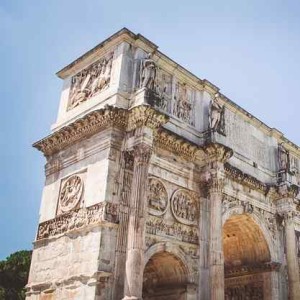Episodes

Saturday Jan 19, 2019
Post Christian: State and Religion
Saturday Jan 19, 2019
Saturday Jan 19, 2019
The "Post Christian" series will continue the line of thought that I started in "Why Do Westerners Really Think Science and Faith Are Opposed?" To sum up my hunches from that post in a few lines, I would say that this perceived opposition derives partly from misguided attempts at intellectual piety in the late medieval and early modern period whose aftereffects are still with us today. However, I really think it is more a displaced form of punishment of the Church for the sins of its clergy and its ostensible allies in secular political power, in the present and in the past, for being such massive hypocrites and living in such obvious contrast with the example and teaching of Jesus Christ and his apostles, their early followers, and those who still answer that call today.
I noted in my first post that it was surprising that the Constantinian experiment of making Christianity a state religion lasted as long as it did. That's true from the perspective of the New Testament and the early Church. It could hardly be more obvious, from the canonical books of the N.T., that the movement Jesus of Nazareth started was never intended to be allied with a state. Jesus in the Gospel of John deliberately dodges secular kingship. When Pilate confronts him about being the Messiah and therefore claiming kingship, Jesus comments that his kingdom is not here, in this life. Luke and Paul pick up most particularly on this Jesus' concern for the poor and his habit of hanging about with them rather than the movers and shakers of political life, and they recommend this behavior as an example to those who follow him.
Of course, the very word "secular" comes from the Latin "saeculum" and we inherit it from Catholic thought, distinguishing the "saeculum" or this age from the more important concerns of eternity. The union of Church and state was always precarious, even in its arguable golden and silver ages of the fourth century and the high medieval period. The question is why this union was attempted at all.
The answer, it seems to me, is an enormously strong human tendency toward seeing service to the gods and service to the community or state as merely two sides of the same smooth round inseparable concept. Seen from this perspective, it was inevitable that if Christianity gathered enough of a following, states would grow up where the experiment of bridging the unbridgeable chasm would be tried.
I tend to assume everyone has read the same things I have. Perhaps it's that dash of Asperger's syndrome I have long wondered about... In any case, let me draw out a few parallels just for the sake of reminders about how differently ancient societies worked:
Homer's Iliad and Odyssey shaped the ancient Hellenistic and Roman imagination in pervasive ways. In the Iliad, of course, the gods are all completely preoccupied with the political struggle unfolding on the shore of Asia Minor, intervening in messy and violent ways on behalf of their clients. Human and divine affairs are sewn together very tightly.
In ancient Rome, among the many elected offices that successful men of means pursued on the cursus honorum were any number of niche priesthoods. As a contemporary Catholic this sounds quite bizarre, but perhaps my Protestant brethren do not find it quite so odd. In any case, these priests were clearly part of the political establishment and had their bureaucratic functions, and conversely the praetors and consuls and censors had their own priestly functions.
A casual read of some of the Chinese classics, such as the writings of Confucius, Mencius, and even Lao Tzu, makes it clear that the Chinese mind was formed by thinkers who expended considerable effort seeking understanding of how best to govern. Spiritual affairs and the matters of the gods are all subjected toward that end in Confucianism, and even the more inward and mystical Taoism had no shortage of adages to guide the statesman. (It is no wonder that Chinese governments down to this very day seem to have no idea what a religious movement not rigidly controlled by state bureaucrats could even be, aside from a rebellion.)
I could go on endlessly, of course. Politics so easily dominates the human mind that if something is excluded from political process, as religion has been in the West, it inevitably leaves the awareness of many people. By the same token, if something begins to loom large in public consciousness, it begins to be debated in the halls of power whether it needs or wants to be or not.
Such, broadly speaking, has been the fate of Christianity.
The Post Christian meditations address the larger question, "Why do people believe science and the Catholic, Christian faith are mutually contradictory?" by considering the background reasons why people in the modern West desire to punish the faith of their ancestors and deny it credibility, apart from any cogent reasons to reject its actual dogmas and teachings.


No comments yet. Be the first to say something!